John Gotti: What to Know About the Life and Death of the Infamous Mob Boss
- Oops!Something went wrong.Please try again later.
- Oops!Something went wrong.Please try again later.
John Gotti, the late boss of the Gambino crime family, is the subject of the Netflix documentary Get Gotti
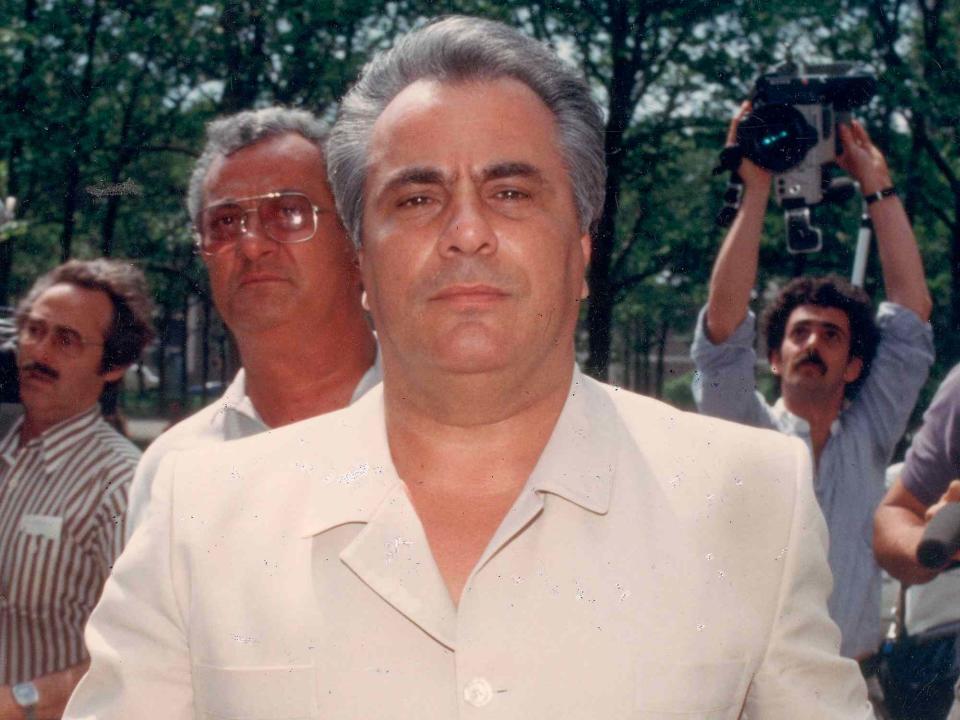
Yvonne Hemsey/ Getty
John Gotti, aka "The Dapper Don," arriving at a courthouse for his hearing in 2001.John Gotti was one of the most infamous crime bosses of all time.
The notorious head of the Gambino crime family seemed invincible, escaping several criminal convictions after rising up the ranks following the public slaying of his predecessor Paul Castellano — but even he couldn't evade the law forever.
Gotti, who died behind bars in 2002 while serving a life sentence for five murders and racketeering, was a headline-making criminal and considered a "big fish" by law enforcement.
Netflix's documentary Get Gotti chronicles the fall of the charismatic, well-coiffed capo from the top of one of New York City's biggest crime families, as well as how government agencies, including the Department of Justice, Organized Crime Task Force and FBI, each worked to take him down, sometimes together and sometimes against one another. In the end, it was the FBI, using Gotti's own boasting, that finally got charges to stick to the infamous Teflon Don.
Find out how the infamous crime boss John Gotti rose to power in the Gambino crime family, how he died and the legacy he left behind.
He first became embroiled with gangs when he was a teenager
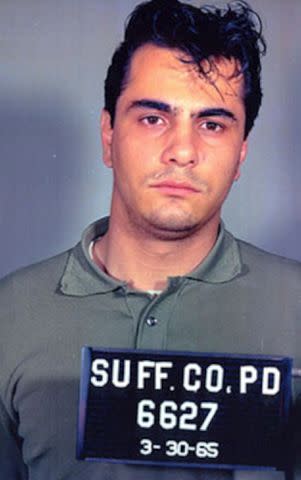
Kypros/Getty
John Gotti in a mug shot on March 30, 1965.John Joseph Gotti was born on Oct. 27, 1940, in the Bronx borough of N.Y.C. and was the fifth of 13 children, with two of his siblings dying at birth. Gotti's parents, John and Fannie, were both children of immigrants, according to The New York Times, and often struggled financially. When Gotti was 12 years old, his family moved to Brooklyn's East New York neighborhood, which at the time was a hotbed for gang activity.
He reportedly got involved with local gangs at a young age, leading one called the Fulton-Rockaway Boys and running errands for a local Gambino crime family capo's social club. It was there he met his Gambino mentor, Aniello Dellacroce. By the time Gotti was 16, he had dropped out of high school to work full-time in organized crime. His brothers Peter and Gene later became "made men" as well, and worked with him in the Gambino crime family.
He was accused of dodging the draft
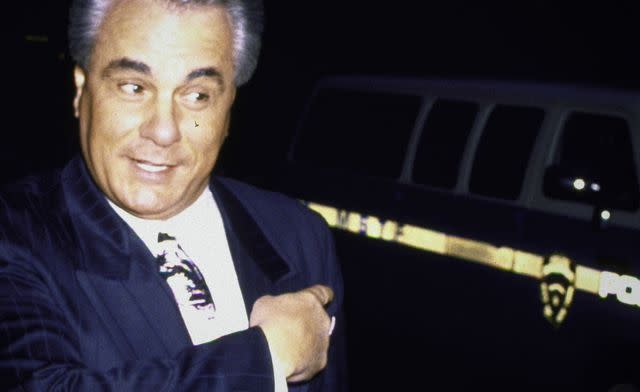
Courtesy of Netflix
John Gotti in 'Get Gotti'.Gotti received an induction notice from his local Vietnam War draft board in 1963, but ignored it, according to CBS News. When Gotti missed his enlistment deadline of Nov. 22, 1963 (the same day then-President John F. Kennedy was assassinated), he became officially delinquent.
Gotti was arrested in 1965 for attempted car theft, and after a November 1965 court appearance for the charge, authorities reportedly questioned him about his failure to enlist.
"Gotti advised he did not realize he was delinquent with his draft board in as much as he is married and has two children," investigators wrote in a memo. "He further advised he felt because of this and the fact he has been previously arrested he was not eligible for the Armed Forces."
CBS News reported that Gotti claimed he was willing to enlist and fight in the Vietnam War, but by 1966, he was incarcerated for a car theft attempt.
One of his sons died in an accident, and Gotti was accused of exacting revenge
Gotti met his wife Victoria DiGiorgio in 1958 at a bar. He and DiGiorgio, who was of Italian and Russian descent, got married on March 6, 1962, when Victoria was 17 years old. They shared daughters Angela and Victoria and sons John Jr., Frank and Peter.
In 1980, when Gotti's son Frank was 12 years old, a Gotti family neighbor in Howard Beach, Queens, named John Favara accidentally ran him over while Frank was riding a minibike near a dumpster, killing him. The New York Daily News reported that after Frank's death, Favara began getting anonymous threats, and was allegedly attacked by Victoria with a baseball bat after visiting the Gottis to apologize.
Fearing for his life, Favara put his home on the market. In July 1980, while the Gotti family vacationed in Florida, a group allegedly attacked Favara while walking to his car after work, beating and shooting him, then putting him in the back of a van and driving away. Favara was never seen again, and his remains have never been found.
When detectives questioned John and Victoria Gotti after the incident, Victoria reportedly told them, "I don't know what happened to him, but I'm not sorry if something did. He never sent me a card. He never apologized. He never even got his car fixed." John, meanwhile, shrugged and said, "He killed my kid."
He was famously well-dressed and groomed
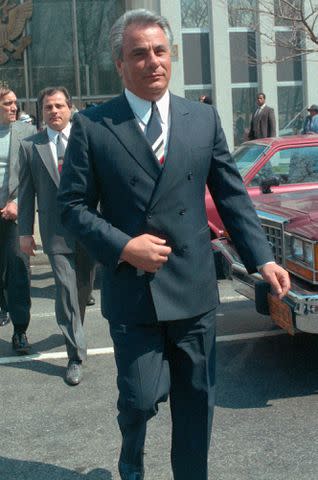
Bettmann
John Gotti pictured at Brooklyn Federal Court in 1986.One of Gotti's nicknames was "Dapper Don" for a reason: He was famous for wearing pricey suits, handpainted ties and coordinating pocket squares from the designer Brioni. In 2006, attorney Charlie Carnesi told The New York Post that he wore a vintage Brioni tie from the late boss's collection to defend Gotti's son John Jr. in court when the gangster's son faced a racketeering charge.
"Young John asked me to wear it today for good luck," he said. "I wore this tie when there was a hung jury in the second trial, so young John figured it might be good luck." Carnesi added, "That's pretty much all what John Sr. wore — Brioni suits, Brioni ties. And, no, I don't know how much it cost — but it wasn't cheap."
Though Brioni was his preferred brand, after his death in 2002, a rep for the designer told The New York Times that they never served or saw Gotti in their New York City store. The New York Times also reported that he also got a professional manicure, haircut and blow-dry every single day once he became a boss.
Carnesi said that Gotti wasn't just particular about his own appearance, but also of those with whom he associated.
"John had a thing about people around him to dress properly," Carnesi told The New York Post. "Now, if you weren't wearing the right tie, he'd give you a hard time, but he would give you a harder time if your tie was nicer than his."
He organized the murder of his former boss
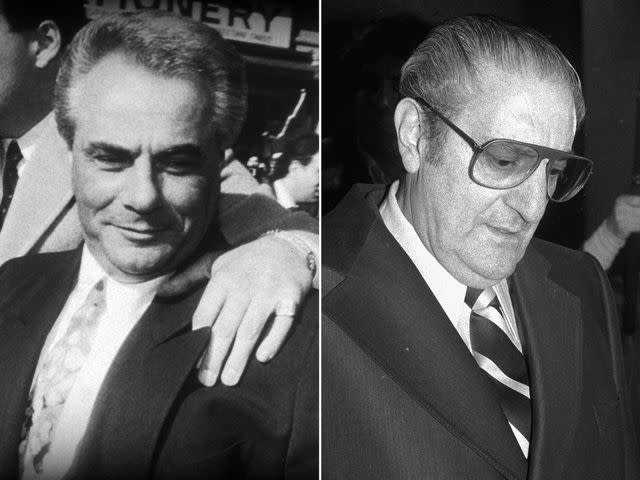
Mike Lipack/NY Daily News Archive/Getty
John Gotti in 'Get Gotti'. ; Big Paul Castellano.Gotti rose up the ranks of the Gambino crime family quickly, but often found himself at odds with its boss, Paul "Big Paulie" Castellano. Castellano reportedly was furious with Gotti's alleged drug dealing and flashy nature, while Gotti was said to take issue with Castellano's greed. Gotti's mentor Dellacroce, an underboss overseeing 10 of the 23 family "crews," served as a buffer between Castellano and Gotti until Dellacroce's death from cancer in 1971, The New York Times reported.
Two weeks after Dellacroce's death, Gotti arranged the murder of Castellano outside of Sparks Steakhouse in Midtown Manhattan. Four men in trenchcoats and Russian hats ambushed Castellano and his close associate Thomas Bilotti, both of whom died from gunshot wounds.
After Castellano died, Gotti took over the Gambino family as its boss. Authorities told The New York Times in 1989 that after Castellano's murder, Gotti met freely and openly with drug traffickers, all but confirming that Castellano was right about Gotti's dealings.
He was nicknamed "Teflon Don"
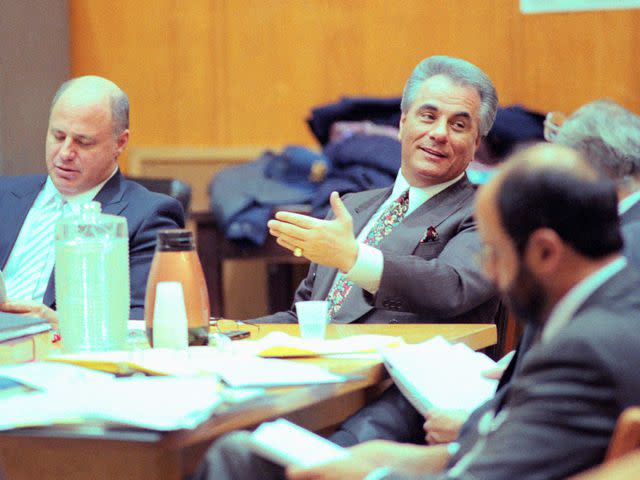
Bettmann
John Gotti during his assault trial in 1990.In addition to his "Dapper Don" nickname, Gotti later earned the nickname "Teflon Don," because he was acquitted in three different, consecutive criminal trials between 1986 and 1990 — and even got a murder charge knocked down.
In 1973, Gotti posed as a detective to "arrest" James McBratney, who was suspected of kidnapping and murdering mob boss Carlo Gambino's nephew, The New York Times reported. Instead of arresting McBratney, Gotti and an associate murdered him. Gotti fled and was arrested in 1974, but pleaded his charges down to attempted manslaughter, serving only four years behind bars.
In 1984, Gotti was arrested for allegedly assaulting a man and stealing his wallet in a parking dispute, but by the time Gotti went on trial in 1986, his accuser testified that he didn't recognize Gotti. Gotti was acquitted.
In March 1987, Gotti was acquitted of federal racketeering and conspiracy. He told reporters on his way out of court, ''They'll be ready to frame us again in two weeks. In three weeks we'll be starting again, just watch.''
Less than three years later, Gotti was acquitted a third time, this time of four charges of assault and two charges of conspiracy related to the 1986 shooting of carpenters' union boss John F. O'Connor. The New York Times reported that Gotti told his arresting officer in the case, "Three to one I beat this charge."
Gotti's acquittals were largely thanks to bribery and witness intimidation, for which his Gambino associate Salvatore "Sammy the Bull" Gravano took credit.
One of his closest associates turned him in
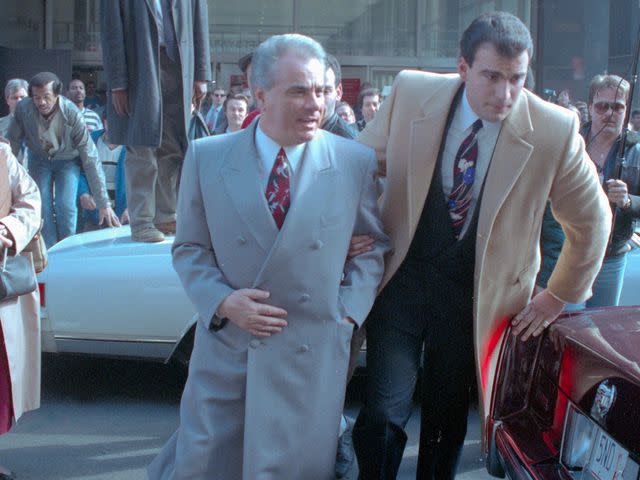
Bettmann
John Gotti outside of the court during his assault trial in 1990.It was Gotti's order to murder Castellano that made him a boss — and landed him behind bars for good.
Federal agents planted hidden recording devices in Gotti's Ravenite social club, capturing audio of his discussions and meetings, which they later used against him. On Dec. 11, 1990, they arrested Gotti and fellow Gambino members Gravano and Frank Locascio. Gotti was charged with five murders, including the slayings of Castellano and Bilotti, as well as with racketeering, conspiracy to commit murder, illegal gambling, bribery, tax evasion, obstruction of justice and loan sharking.
Gravano, who admitted to killing at least 19 people during his tenure with the Gambinos, made a deal with prosecutors to act as an informant. According to The New York Post, the FBI recordings of Gotti's meetings, which had been played in pretrial proceedings, were a driving factor in Gravano's cooperation with the government: Gravano believed that Gotti was going to have him killed based on audio the prosecution played for him.
Gravano testified for nine days on the stand in Gotti's 1992 trial, claiming that Gotti orchestrated the killings to assert his power within the mob, as well as out of fear that Castellano would kill Gotti over his alleged drug sales. Gravano said he was in a car with Gotti at the time of the Castellano and Bilotti slayings and described himself as a "backup shooter."
In April 1992, after 14 hours of deliberations, the jury found Gotti guilty of all 13 charges. That June, Gotti was sentenced to life in prison without a chance of parole.
At the time of Gotti's conviction, New York FBI boss Jim Fox told reporters, "The Teflon is gone. The Don is covered with Velcro."
He was a huge fan of The Godfather
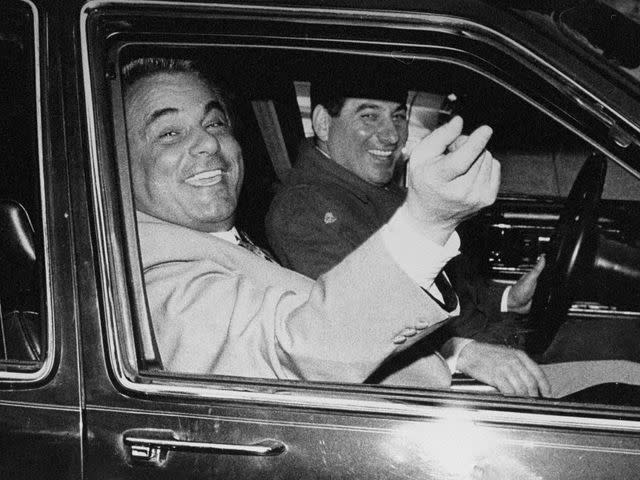
NY Daily News Archive/Getty
John Gotti at the Ravenite Social Club on Mulberry St., circa 1990.John Martino, who played made man and Vito Corleone's personal chauffeur in The Godfather, said he was friendly with Gotti and that Gotti loved the classic film.
Martino, reportedly a nephew of legendary gangster Charles "Lucky" Luciano in real life, told The New York Post that Gotti asked one of his relatives to meet Martino. He linked up with Gotti at one of Gotti's social clubs just after Gotti was named the boss of the Gambino crime family.
"I walked in, Gotti was sitting [at] the corner table with a few men around the table and a bunch of other guys in the room and everybody was greeting me," Martino recalled. "Then John got up, he buttoned his jacket, he comes right to me, grabs my two hands, kissed me on the lips. And he said, 'Johnny, I'm so glad you came, I wanted to meet you so bad. If there's anything I could ever do for you.' "
Martino said Gotti asked him to shake hands with his friends and associates at the table and that Martino obliged and became close with the group, visiting them at meetings on Wednesdays afterward.
Other mobsters tried to put hits out on him
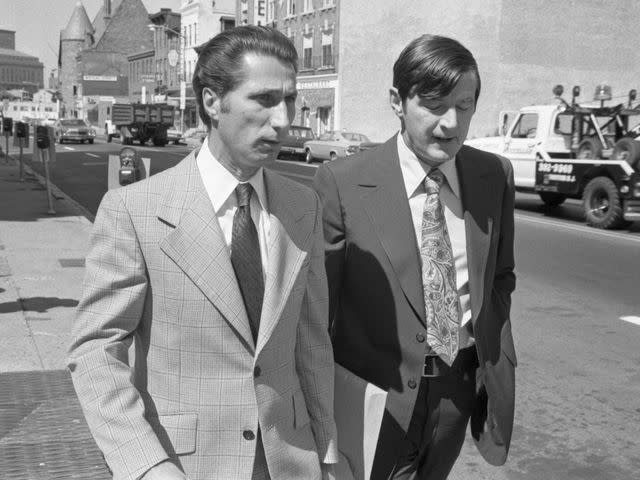
Bettman
Anthony Louis Manna with his attorney, Don Conway entering Mercer County Courthouse in 1975.In 1989, Louis "The Thin Guy" Manna, third in command of the Genovese crime family, was convicted of putting a hit out on Gotti and Gotti's brother Gene, as well as orchestrating the murder of businessman and mob associate Irwin Schiff, The New York Times reported. Authorities alerted Gotti of the murder plot, NJ.com reported, and Manna was sentenced to 80 years in prison.
Manna wasn't the only one who thought about murdering Gotti. Gravano claimed in a 2019 interview that he considered putting a hit out on Gotti as well, alleging that Gotti told him he needed Gravano to be a "sacrificial lamb" to the feds to keep Gotti out of prison. Gravano recalled making a list of people to help with the hit, as well as a list of other people he'd have to kill if he went through with murdering Gotti.
"Here's my best f–king friend, my boss. I did so many things for this guy. I rigged the trials, I threatened people, I f–king bribed people, and he turns on me," Gravano said. "I was betrayed by someone who’s a brother, a father, somebody you gave your whole life to. When the rubber meets the road, he’s throwing you to the wolves. It broke my heart, it broke me."
In the end, Gravano said, he literally and figuratively didn't pull the trigger, instead flipping his loyalty to prosecutors.
He died in prison
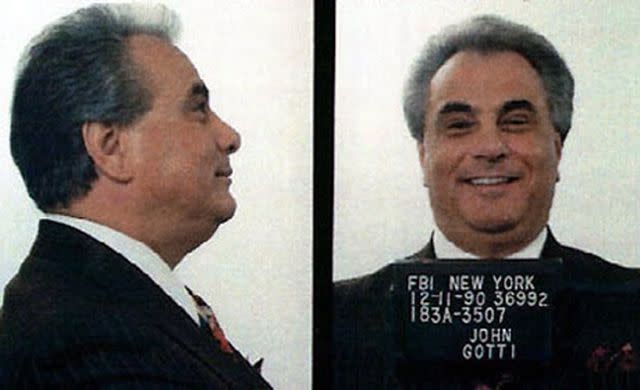
Donaldson Collection/Michael Ochs Archives/Getty
FBI mug shot of mafia Don John Gotti on December 11, 1990.Gotti died of throat cancer on June 10, 2002, in a Springfield, Missouri, prison hospital.
Gotti's funeral five days later was a spectacle in Queens, New York. According to The New York Times, there were 19 limousines just for flower displays (which included a cigar, martini glass, royal flush in poker, a New York Yankees logo and a racehorse), then another 22 for the late boss's family and friends in attendance. He was reportedly denied a public funeral mass by the Brooklyn Diocese, but several hundred spectators stood outside the Howard Beach church where a memorial service was held for his loved ones.
Several of his relatives, including son John Gotti Jr., brothers Gene and Peter and son-in-law Carmine Agnello, weren't able to attend his funeral because they were incarcerated for crimes ranging from racketeering to drug trafficking and tax evasion, The New York Times reported.
Gotti was buried in St. John's Cemetery in Middle Village, New York, where his father and his son Frank were laid to rest — and where Lucky Luciano, Carlo Gambino and Dellacroce are also buried.
His namesake continued his crime legacy
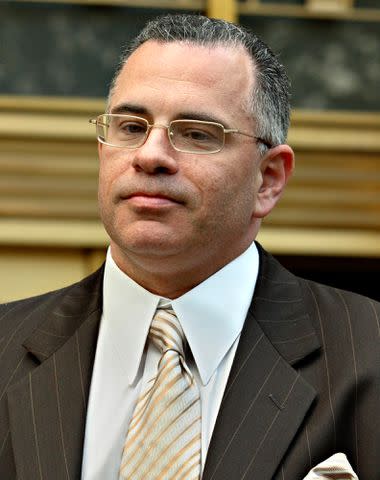
Adam Rountree/Bloomberg/Getty
John A. ``Junior'' Gotti at Manhattan Federal Court in 2006.Gotti's son, John Gotti Jr., followed in his father's footsteps to lead the Gambino crime family. Gotti Jr. became a made man in 1988, later telling 60 Minutes it was the "proudest moment of [his] life" because it meant he was like his father.
"My father was my cause. If my father wasn't in that life, I probably wouldn't have been in the street life either," Gotti Jr. told Kroft. "Whatever he was is what I wanted to be. And if he decided the next day, 'You know what? I don't like this anymore. I'm gonna be a butcher,' I would tell him, 'I hope you have a smock for me.' That's the way I feel. That's the way I felt."
Gotti Jr. was charged with racketeering in 1998 and spent nine months in jail during negotiations between his attorneys and prosecutors and, while incarcerated, was able to visit his father at a prison medical center in Springfield, Missouri. He entered a plea deal that went against his father's wishes, serving six years and five months and paying a $1 million fine, per The New York Times.
Weeks before he was scheduled to be released from prison, he was indicted on new racketeering charges stemming from an alleged attack he ordered on Curtis Sliwa. Similar to his Teflon Don father, Gotti was tried three separate times for the charges, each ending in a deadlocked jury and mistrial.
In 2008, Gotti Jr. faced more racketeering charges tied to several murders and a drug trafficking ring. Gotti Jr.'s former associate John Alite cooperated with prosecutors as an informant, but in December 2009, the judge in the case declared yet another mistrial, The New York Times reported. The government opted not to try Gotti Jr. again.
Gotti Jr. was accused of being an informant for the government at the time, but he later told The New York Daily News that it was unfair to call him a "rat" because he deliberately fed the government false information.
In 2015, Gotti Jr. wrote a book about his relationship with his father, titled Shadow of My Father. He sold the rights to a film about his life, which later became John Travolta's film Gotti.
His daughter and grandsons appeared on a reality show

SGranitz/WireImage
John Gotti Jr., Victoria Gotti and Carmine Gotti during the 2005 Teen Choice Awards.Gotti's daughter Victoria and her sons Frank Gotti Agnello, John Gotti Agnello Jr. and Carmine Gotti Agnello Jr. starred in the reality show Growing Up Gotti. The show premiered in August 2004 and ran for three seasons. In 2019, Victoria teamed up with Lifetime for the TV biopic Victoria Gotti: My Father's Daughter.
In 2018, Carmine was charged with falsifying business records and operating a scrapyard without a license, The New York Post reported. He pleaded down to a misdemeanor to avoid jail time, agreeing to a $1,000 fine and forfeiting $4,605 in income from the business. In 2022, the scrapyard was sued by the state of New York for allegedly violating environmental laws around pollution and toxic waste.
Gotti Jr.'s son John Gotti III is an MMA fighter and boxer. In June 2023, TMZ reported that Gotti III was suspended from boxing for six months in Florida following a brawl during an exhibition with Floyd Mayweather Jr.
For more People news, make sure to sign up for our newsletter!
Read the original article on People.

